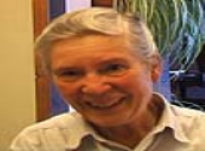Hazel - Interview 26

More about me...
Hazel re-wrote this section and talks about her experiences in her own words.
Having had malignant melanoma in 1986, when Hazel was invited for routine breast screening in 1991, aged 57, she thought it would be sensible to accept. She was then recalled because an abnormality had been observed on this first mammogram. She agreed to undergo a wide local excision.
She came to realise that it was essential that any woman being invited to attend for breast screening should be able to have all the information necessary for her to make a properly informed decision whether to attend or not. This should include clear presentation of potential harms as well as potential benefit, based on latest available evidence, including the one in five potential to be diagnosed with DCIS through screening, and then undergo invasive interventions that can follow, maybe unnecessarily.
Hazel was interviewed for the Healthtalkonline website in 2004.
Hazel declined to take part in a trial because she didn't have the information she needed. She felt doctors didn't know enough about the best way to treat DCIS.
Hazel declined to take part in a trial because she didn't have the information she needed. She felt doctors didn't know enough about the best way to treat DCIS.
The 4 choices in the trial and the trial was to look at the management of this condition to prevent recurrence, didn’t even look at survival. And I can assure you that if you’ve just been told you’ve got carcinoma, the thing that pops into your head quick as a flash is, oops [laughing] how long have I got, you know? So, it was purely to look at the management, purely to see what to do when you’ve got this condition. What did you ask me? I’ve forgotten.
What did they want to do?

